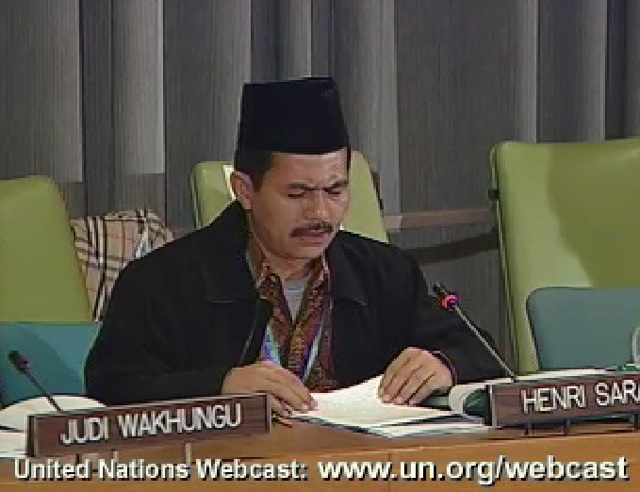Via Campesina statement at the UN General Assembly on The Global Food Crisis and the Right to Food

Ladies and Gentlemen,
Allow me to further explain how the right to food should become a framework for all. As a thematic mechanism of the UN Human Rights Council, the right to food repeatedly addresses the issue of discrimination in its mandate. It is well recorded that peasants are discriminated regarding access to land, water, and natural resources. In regard to monitoring the right to food, the report of the Intergovernmental Plenary Session of IAASTD (International Assesment of Agricultural Knowledge, Science, and Technology for Development) in 2008 acknowledged that for the past 60 years, indigenous and traditional peasant and agricultural systems have been heavily discriminated against. Moreover, discrimination could take place where justice systems favoured the literate, the collaterally and socially advantaged, and others. All these social structures often work against peasants.
Therefore, I personally urge all of us to pay particular attention to the specific vulnerability of peasants to violations on the right to adequate food, and of human rights in general. The mechanisms for the right to food, in particular, could have a prominent role in leading intergovernmental agencies in the UN system in indentifying potential gaps and entitlements on the rights of peasants, and how to address these gaps.
I am honoured to share with all of you that La Via Campesina has been working to transform the experiences of peasants through the promotion of the Declaration on the Rights of Peasants. The Declaration was adopted at a Via Campesina International Conference on Rights of Peasants in Jakarta in 2008. I would like to present this proposal to encourage a discussion for new, sustainable and just food systems for all.
This declaration could be one of the efforts to institusionalize the right to food. Further research and deliberation regarding this matter from various promotors of the right to food will be a significant response to the world food crisis. We feel this would be a powerful approach toward protecting and to promoting the rights of peasants, including our right to food, against violations by states and transnational corporations (TNCs). This will be a new approach to combat hunger and malnutrition—as well as addressing the problem of poverty and unemployment.
Honorable participants of Interactive Thematic Dialogue,
This April 17, we, peasants, small farmers, small producers and landless people, will commemorate the International Day of the Peasants’ Struggle. Since 1996, April 17 is a monumental day for peasants all over the world to remember and continue the daily struggle to protect our rights. On the same day 13 years ago, 19 peasants were killed at Eldorado de Carajas, Brazil, because they were defending their rights and their communities.
The same violations of peasants’ human rights exist today. The current food crisis shows us the widespread and systemic violations of the rights of peasants. Peasants suffer violent oppression as a daily experience: We are increasingly and violently expelled from our lands and alienated from our sources of livelihood. We cannot earn an income that allow us to live in dignity. We are increasingly prohibited from maintaining, preserving, exchanging and growing our own seeds, and our agricultural knowledge is therefore disappearing and we are being forced to buy seeds from TNCs in order to increase their profits. Many peasants all over the world are being criminalised because they are fighting for their rights, especially for access to land and productive resources. In fact, there have been an increasing number of cases as large TNCs seek to control more land and impose industrial food and agrofuel production. These cases were reiterated once again by various social movements, even the FAO in 2003.
